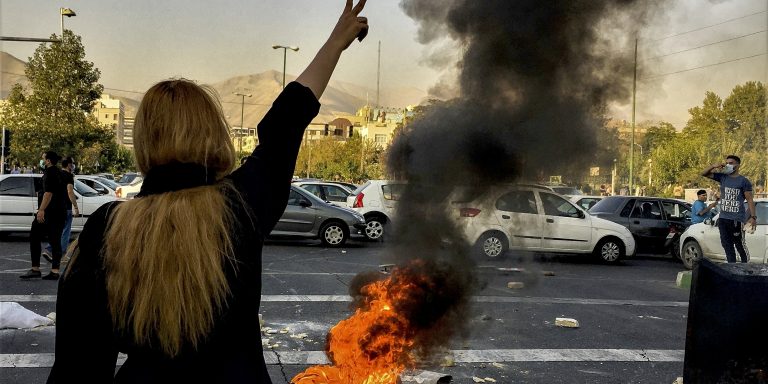INTELBRIEF
December 19, 2022
IntelBrief: Iran Escalates Crackdown in Latest Attempt to Quell Uprising

Bottom Line up Front
- Iranian leaders are considering the possibility of offering concessions while simultaneously escalating their crackdown against protesters in an effort to quell the three-month-old uprising.
- Hardliners in the regime believe that executing protesters will cause the woman-led unrest to subside.
- Regime moderates have criticized the executions and seek to end enforcement of some of the restrictions that triggered the uprising.
- Iran’s escalating crackdown is increasing the government’s international isolation, exemplified by its December expulsion from a United Nations Commission on the Status of Women.
Suggesting the existence of significant divisions within Iran’s regime, Iranian officials are altering their responses to try to quell a three-month long uprising that began with the mid-September death of a 22-year-old woman, Mahsa Amini, while in the custody of Iran’s morality police. The unit enforces the country’s strict public dress code for women. The uprising is still led by women demanding greater freedoms, but since September it has expanded to encompass many additional segments of Iranian society, clamoring for an outright end to the Islamic Republic. By all accounts, regime leaders have become increasingly frustrated that the standard “playbook” used in past uprisings – deployment of security forces, incarceration of protesters, and interruption of social media channels – has failed to quell the unrest. Far from subsiding, the protests now feature, in addition to widespread demonstrations, extensive strikes among workers in several economic sectors, including the all-important bazaar (merchant community). The death toll among protesters exceeds 450 as of mid-December, and at least 14,000 have been arrested.
The uprising has brought to the fore longstanding cleavages among regime elites – divisions that have appeared in national elections and policy disputes. Hardliners in the regime reject offering concessions to protester demands, and instead advocate escalating the crackdown. According to this view, imposing stricter punishments will deter Iranians from joining protests. Bowing to hardline pressure, in December the Iranian judiciary executed two protestors convicted of separate attacks on members of the Basij, an internal security force controlled by the Islamic Revolutionary Guard Corps (IRGC). They were convicted by Iran’s Revolutionary Courts of committing “enmity against God.” Yet, the executions appear to have only fueled, rather than suppressed, further protests, while at the same time triggering a backlash among key institutions who question the execution tactics. A coalition of scholars and senior Shia clerics from the theological schools in the city of Qom criticized the legitimacy of the trials that resulted in the convictions of those executed. Still, judicial officials indicate that additional death sentences against protesters will be carried out.
Sensing that the hardliners are on the defensive over the unrest, regime moderates – long in eclipse, particularly since the 2021 election of hardline President Ebrahim Raisi – have become more vocal. Some have criticized the extensive use of force against protesters and advocate addressing the demands of demonstrators. Former reformist president Mohammad Khatami, largely silenced by the hardliners since he left office in 2005, has appealed for a public referendum to address the unrest. His Reform Front political faction has demanded “immediate, courageous and innovative changes” to launch a national dialogue with “disappointed, dissatisfied and angry citizens.” In October, former Speaker of Parliament Ali Larijani – who often took hardline positions on major issues – warned that the use of extreme measures to end the protests would only generate additional backlash. Several members of Supreme Leader Ali Khamenei’s family have denounced the regime for excessive use of force. Some security force members have questioned orders to use live ammunition and brute force against demonstrators, particularly against women.
Reflecting the view that some concessions to protester demands are warranted, in early December, a key justice official, Attorney General Mohammad Javad Montazeri, stated that the morality police “was abolished by the same authorities who installed it.” However, subsequent comments by other government leaders suggested that decisions to abolish the morality police or repeal female dress code laws had not been finalized but remained under review. Prominent women and other opposition activists dismiss government statements about possible relaxation of dress code enforcement, asserting that the regime seeks only to quiet protests without implementing meaningful changes. One activist explained that disbanding the morality police would not bring significant change because “[the requirement that women cover their hair] is still compulsory and enforced by other means such as expulsion from university or school.” On the other hand, some experts note that the demonstrations have achieved significant results insofar as many Iranian women, particularly in Tehran and other major cities, have stopped abiding by the dress code.
The international community has progressively sharpened its responses to Iran’s crackdown on protesters, hoping to empower the demonstrators and discredit regime hardliners. In September, the United States imposed sanctions on the morality police, and U.S. officials have also sanctioned several Iranian law enforcement entities and commanders for their role in the crackdown. In late November, the U.N. Human Rights Council voted overwhelmingly to set up a fact-finding investigation into human rights abuses in Iran. On December 14, the U.N. Economic and Social Council (ECOSOC) adopted a resolution to remove Iran from the Commission on the Status of Women (CSW) for the remainder of its four-year term ending in 2026. The 45-member CSW meets annually and aims to promote gender equality and the empowerment of women. Although some regime insiders are sensitive to multilateral and U.N. action against Iran’s crackdown, there are no clear indications, to date, that Iran’s hardliner-dominated senior leadership is ready to abandon the harsh tactics that have helped them contain past episodes of unrest.